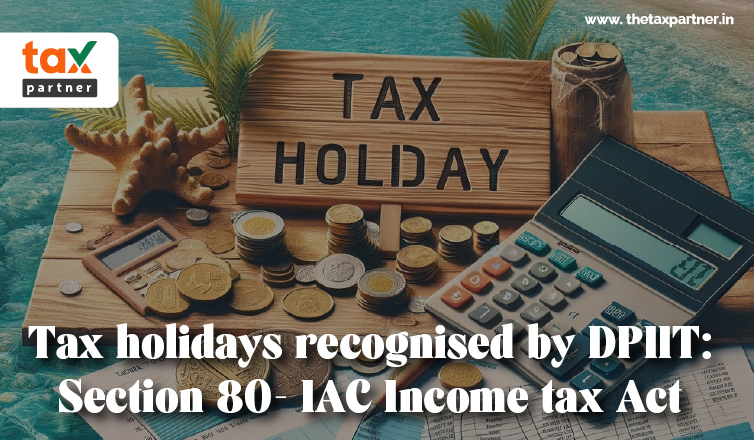

The Income Tax Act's Section 80-IAC gives Indian entrepreneurs a vital lifeline by giving them a three-year tax break during their first few years of business. This provision's main goal is to promote entrepreneurship and innovation in the nation by supporting the founding and expansion of new companies. Section 80-IAC attempts to lessen the financial burden on startups by giving them a sizable tax relief. This will enable them to devote more of their resources to R&D and expansion projects rather than paying taxes. This tax vacation stimulates the growth of entrepreneurs, enabling them to innovate, generate employment, and support the country's economic expansion.
Section 80-IAC was created with the intention of promoting entrepreneurship by easing the financial burdens on young businesses and enabling them to reinvest their profits in the company following listed are the reasons why section 80-IAC was included-
According to Section 80IAC of the Income Tax Act, the following requirements must be met in order to qualify for the tax holiday:
Meeting these criteria allows startups to qualify for the tax holiday and enjoy the associated benefits.
DPIIT Recognition: The startup must first register and obtain recognition from the Department for Promotion of Industry and Internal Trade (DPIIT) through the Startup India portal. This involves providing necessary details about the startup's incorporation, business activities, and compliance with eligibility criteria.
Documentation: Once registered, the startup needs to gather and submit all required documents as per the checklist provided by DPIIT. These documents typically include proof of incorporation, audited financial statements, details of innovation or development activities, and any other relevant certifications or registrations.
Online Application:The startup can then apply for the tax holiday benefit under Section 80-IAC through the Startup India portal. The application requires filling in the necessary information and uploading the supporting documents.
Review Process:The application undergoes a thorough review by the Inter-Ministerial Board (IMB) appointed by DPIIT. The IMB assesses the startup's eligibility based on its innovative nature, scalability, and potential for wealth creation or employment generation.
Approval and Certification:Upon successful review, the startup receives approval from the IMB and a certificate of eligibility for availing the tax holiday under Section 80IAC.
Claiming the Tax Holiday: Once certified, the startup can claim the tax holiday benefit while filing its income tax returns. The startup needs to ensure compliance with all relevant tax laws and regulations while availing of the tax holiday.
By reducing the financial burden on companies in their early stages, the tax holiday encourages entrepreneurs to focus on innovation and R&D activities. This leads to the development of new products, services, and technology, which drives overall ecosystem innovation.
Tax breaks make entrepreneurship more appealing and accessible to potential creators. It encourages people with new ideas to take the risk and create their own businesses, encouraging an entrepreneurial culture throughout the country.
The availability of tax breaks increases the appeal of startups to domestic and international investors. Investors are more likely to support firms with the potential to develop quickly and qualify for tax breaks, resulting in larger investment flows into the startup ecosystem.
As startups grow and expand, they create job chances in a variety of industries, helping to generate jobs and promote socio economic development. The tax break allows firms to acquire talent and establish strong teams, thereby boosting job creation.
A strong startup environment boosts India's competitiveness on the global stage. It encourages the development of creative solutions and disruptive technology, establishing Indian startups as major players in the global market.
Startups can reinvest their holiday tax savings in scaling up operations, increasing their market reach, and adding more employees. This faster growth benefits not only individual businesses, but also the nation's general economic development.
Meeting the stringent eligibility criteria, such as turnover limits and innovation requirements, can be challenging for some startups. Ensuring compliance with these criteria is essential to qualify for the tax holiday.
The application process for availing the tax holiday involves extensive documentation and scrutiny by the Inter-Ministerial Board (IMB). Startups need to navigate this process diligently to ensure successful certification and approval.
The tax holiday is available for a limited period of three consecutive assessment years out of the first ten years since incorporation. Startups need to strategically plan their utilisation of this benefit within the stipulated time frame to maximise its impact.
While the tax holiday provides relief from income tax payments, startups still need to manage their finances effectively to sustain and grow their operations. They should allocate the tax savings prudently towards growth initiatives and operational expenses.
Startups must remain compliant with all regulatory requirements, including tax laws and regulations, to avoid any penalties or legal issues. Maintaining accurate financial records and adhering to statutory obligations is crucial for long-term sustainability.
While tax incentives can attract investors, startups should be mindful of relying solely on tax benefits to attract funding. Investors may prioritize factors such as market potential, team strength, and scalability alongside tax incentives when evaluating investment opportunities.
Startups should stay updated on any changes or amendments to tax laws and policies that may affect their eligibility for the tax holiday. Adapting to regulatory changes proactively is essential to mitigate risks and ensure continued compliance.
The availability of tax incentives will likely spur greater innovation among startups, leading to the development of disruptive technologies and solutions across various industries. Startups will continue to push boundaries and create new market opportunities through their innovative products and services.
The tax holiday will contribute to the growth and diversification of the startup ecosystem in India. We can expect to see a rise in the number of startups across different sectors, driving economic growth and job creation in the country.
The tax benefits provided under Section 80-IAC will attract more investment into the startup ecosystem, both from domestic and international investors. This influx of capital will fuel the growth and expansion of startups, enabling them to scale their operations and reach new markets.
The government's continued support for startups through initiatives like Section 80-IAC reflects its commitment to fostering entrepreneurship and innovation in India. We can anticipate further policy measures and incentives aimed at creating an enabling environment for startup growth.
Indian startups will increasingly compete on the global stage, leveraging their innovative solutions and scalable business models. With the support of tax incentives and a conducive ecosystem, Indian startups have the potential to emerge as global leaders in their respective domains.
Startups will play a crucial role in driving digital transformation and technology adoption across industries. We can expect to see startups leveraging emerging technologies such as artificial intelligence, blockchain, and the Internet of Things to address complex challenges and unlock new opportunities.
Overall, the future outlook for startups benefiting from the tax holiday under Section 80-IAC is bright, with ample opportunities for growth, innovation, and success in the evolving business landscape. As startups continue to thrive and expand, they will contribute significantly to India's economic development and global competitiveness.
Form 10CCB is a document used for claiming deductions under Section 80-IAC of the Income Tax Act. It is a certificate issued by a chartered accountant verifying that the startup has complied with the conditions specified under Section 80-IAC and is eligible for the tax holiday. Startups need to submit Form 10CCB along with their Income Tax Return to claim the deduction for profits and gains derived from eligible business activities. The form contains details such as the name and address of the startup, the assessment year for which the deduction is being claimed, the amount of eligible deduction, and a declaration by the chartered accountant certifying the startup's compliance with the conditions of Section 80-IAC. It serves as a crucial document for the tax authorities to verify the eligibility of startups for the tax holiday and ensure compliance with the provisions of the Income Tax Act.
By following these steps and including Form 10CCB issued by the chartered accountant, startups can claim the deduction under Section 80-IAC in their Income Tax Returns accurately and in compliance with the provisions of the Income Tax Act.
Section 80IAC of the Income Tax Act provides a substantial benefit to Indian entrepreneurs by providing them with a crucial tax break during their early stages. This provision demonstrates the government's commitment to encouraging innovation and entrepreneurship by allowing startups to direct funding toward growth and development efforts. However, negotiating the complexities of tax rules and maintaining compliance with eligibility requirements can be difficult for businesses. That's where taxpartner can help. TaxPartner can provide significant experience and direction to help companies utilise the benefits of Section 80-IAC while being compliant with laws.
With TaxPartner assistance, companies can effectively navigate the tax landscape, seize growth possibilities, and contribute to India's thriving startup ecosystem.
What is Section 80-IAC of the Income Tax Act?
Section 80-IAC of the Income Tax Act provides for a deduction in respect of profits and gains derived by an eligible start-up from eligible business.
What are Tax holidays recognized by DPIIT under Section 80-IAC?
DPIIT (Department for Promotion of Industry and Internal Trade) recognizes certain eligible start-ups for tax benefits. These start-ups can avail of a tax holiday for three consecutive assessment years out of seven years since their incorporation.
Who is eligible to avail of tax holidays under Section 80-IAC?
To avail of tax holidays under Section 80-IAC, a start-up must be recognized by DPIIT and fulfill the specified criteria related to date of incorporation, turnover, and nature of business.
What are the criteria for recognition by DPIIT?
DPIIT recognizes start-ups based on their innovative nature, potential for job creation, and scalability of business model. The start-up should also be incorporated as a private limited company or a limited liability partnership.
What types of businesses qualify for tax holidays under Section 80-IAC?
Businesses involved in innovation, development, deployment, or commercialization of new products, processes, or services driven by technology or intellectual property are eligible for tax holidays.
How long can a recognized start-up avail of tax holidays?
A recognized start-up can avail of tax holidays for any three consecutive assessment years out of its first seven years since incorporation.
How does a start-up claim tax benefits under Section 80-IAC?
To claim tax benefits under Section 80-IAC, a recognized start-up must file its income tax return with the prescribed documents and declarations indicating compliance with the conditions laid down under the section.
Can a start-up avail of other tax benefits along with tax holidays under Section 80-IAC?
Yes, a recognized start-up can avail of other tax benefits such as exemption from Angel Tax and Capital Gains Tax subject to compliance with the relevant conditions.
What happens if a start-up fails to meet the eligibility criteria during the tax holiday period?
If a start-up fails to meet the eligibility criteria during the tax holiday period, it may lose its entitlement to claim tax benefits under Section 80-IAC for the remaining period.
Are there any reporting requirements for start-ups availing tax holidays under Section 80-IAC
Yes, recognized start-ups availing tax holidays under Section 80-IAC are required to comply with reporting requirements specified by DPIIT and Income Tax authorities.

